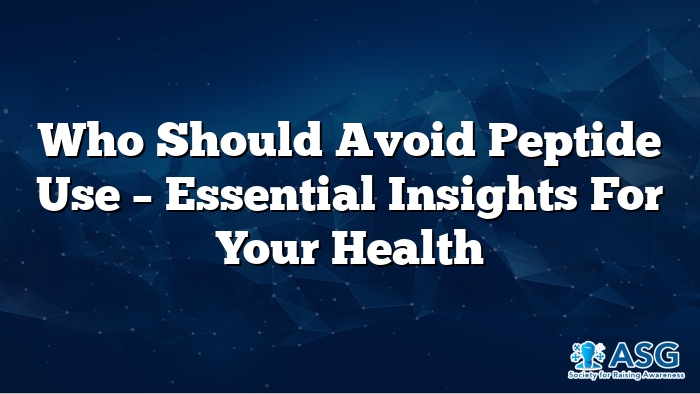Who Should Avoid Peptide Use – Essential Insights for Your Health

Peptides have garnered significant attention in recent years for their potential health benefits and diverse applications. From skincare to muscle growth, these versatile compounds are being explored for their numerous uses. However, it's crucial to understand who should avoid peptide use and the potential side effects associated with them. This comprehensive guide will delve into the medical conditions that contraindicate peptide use, the safety of peptides for different populations, and the ethical considerations in sports. We'll also discuss the importance of consulting healthcare providers before using peptides and the interactions between peptides and medications.
Who Should Avoid Peptide Use?
Certain individuals should exercise caution or avoid using peptides altogether. Those with a history of allergic reactions to peptides or similar substances should refrain from their use. Additionally, individuals with chronic illnesses or autoimmune disorders should consult a healthcare provider before considering peptides.
Pregnant or breastfeeding women should avoid peptides due to the unknown effects on fetal development and breast milk composition. Adolescents should also steer clear of peptides due to potential impacts on growth and development.
Peptide safety is paramount, and it's essential to understand that these compounds are not suitable for everyone. Always prioritize your health and seek professional medical advice before considering peptide use.
Potential Side Effects of Peptides
While peptides offer numerous potential benefits, they can also cause side effects. Common side effects include redness or irritation at the injection site, which is typically mild and short-lived. Some individuals may experience headaches or dizziness after peptide administration.
More severe side effects, although rare, are possible. These may include changes in blood pressure or heart rate. It's crucial to monitor for any adverse reactions and seek immediate medical attention if you experience any concerning symptoms.
Peptide customer service departments at reputable suppliers can often provide information about potential side effects and how to mitigate them. However, always consult a healthcare provider for personalized medical advice.
Medical Conditions That Contraindicate Peptide Use
Certain medical conditions contraindicate peptide use. Individuals with cancer should avoid peptides, as

these compounds can potentially promote tumor growth. This is a critical consideration in peptide safety protocols.
People with kidney or liver disease should also exercise caution when considering peptides. These organs play crucial roles in metabolizing peptides, and impaired function could lead to adverse effects. Always consult a healthcare provider for personalized advice based on your specific medical history.
Are Peptides Safe for Everyone?
The simple answer is no; peptides are not safe for everyone. Safety depends on individual health conditions, age, and other factors. Always consult a healthcare provider before starting any peptide regimen.
Peptides may interact with existing medications, potentially leading to adverse effects. This is why proper medical guidance is essential. Peptide authentication and peptide purity tests are crucial steps in ensuring the safety and efficacy of these compounds.
Peptides and Allergic Reactions
Allergic reactions to peptides are possible and can range from mild to severe. Symptoms may include itching, swelling, and difficulty breathing. If you experience any of these symptoms, seek immediate medical attention.
To mitigate the risk of allergic reactions, always perform a patch test before using peptides. This can help identify potential allergies before full-scale use. Consult a healthcare provider for further advice on managing potential allergic reactions.
Peptides and Autoimmune Disorders
Individuals with autoimmune disorders should be particularly cautious when considering peptide use. Peptides can potentially exacerbate these conditions by triggering an overactive immune response. Always consult a healthcare provider before using peptides if you have an autoimmune disorder.
Autoimmune disorders involve an overactive immune response, and peptides may inadvertently trigger this response. Proper medical guidance is crucial to ensure that peptide use doesn't interfere with existing treatments or worsen your condition.
Interactions Between Peptides and Medications
Peptides can interact with various medications, potentially leading to adverse effects or altering the efficacy of your current treatment regimen. Always inform your healthcare provider about all medications you are taking, including over-the-counter drugs and supplements.
Certain medications may enhance or reduce peptide effects, impacting treatment outcomes. This is why proper medical supervision is essential when using peptides. Peptide analysis and thorough medical history reviews can help identify potential interactions before they become problematic.
Peptides and Pregnancy: What You Need to Know
Pregnant women should avoid peptides due to the unknown effects on fetal development. The safety of peptides during pregnancy has not been well-studied, and it's always better to err on the side of caution when it comes to the health of both mother and child.
Breastfeeding women should also avoid peptides, as the impact on breast milk composition is unknown. Always prioritize safety for both mother and child by consulting with a healthcare provider before considering any new supplements or treatments during pregnancy or while breastfeeding.
Age Restrictions for Peptide Use
Adolescents should avoid peptides due to their potential impact on growth and development. The hormonal changes during adolescence are complex, and introducing peptides could potentially disrupt this delicate balance.
Older adults should also exercise caution when considering peptide use. Age-related health conditions can affect peptide safety and efficacy. Proper medical supervision is essential to ensure that peptide use is appropriate and safe for older individuals.
Peptides and Chronic Illnesses
Individuals with chronic illnesses should be cautious when considering peptide use. Peptides can interact with existing treatments and potentially complicate disease management. Always consult a healthcare provider before incorporating peptides into your health regimen.
Chronic illnesses often require long-term medication, and peptides can impact the efficacy of these medications. Proper medical guidance is crucial to ensure that peptide use doesn't interfere with your current treatment plan or exacerbate your condition.
Consulting Healthcare Providers Before Using Peptides
Always consult a healthcare provider before using peptides. This ensures personalized medical advice tailored to your specific health needs and helps identify potential risks associated with peptide use.
Healthcare providers can guide proper peptide use, including appropriate dosage and administration methods. They can also monitor your progress and adjust your treatment plan as needed. Proper medical supervision is essential for safe and effective peptide use.
Peptides and Hormonal Imbalances
Peptides can impact hormonal balance, which is particularly important for individuals with pre-existing hormonal disorders. Always consult a healthcare provider before using peptides if you have a history of hormonal imbalances.
Hormonal imbalances can affect overall health in numerous ways, and peptides may exacerbate these conditions. Proper medical guidance is crucial to ensure that peptide use doesn't disrupt your hormonal balance or interfere with existing treatments.
Peptides in Sports: Ethical and Health Considerations
Peptides are sometimes used in sports for performance enhancement, which raises both ethical and health concerns. Always consider the potential health risks associated with peptide use for athletic performance.
Many sports organizations ban peptide use due to the unfair advantages they may provide. Always adhere to ethical guidelines and regulations in your sport. Peptide authentication and peptide purity tests are crucial for athletes who are permitted to use certain peptides under medical supervision.
Peptide Use in Adolescents
Adolescents should avoid peptides due to their potential impact on growth and development. The hormonal changes during adolescence are complex, and introducing peptides could potentially disrupt this delicate balance.
Adolescents are still developing physically and mentally, and peptides can interfere with this natural process. Proper medical supervision is essential if peptides are ever considered for adolescents, which should only be in rare, medically necessary cases.
Peptides and Mental Health Conditions
Individuals with mental health conditions should be cautious when considering peptide use. Peptides can impact mood and behavior, potentially interfering with existing mental health treatments.
Mental health conditions often require medication, and peptides can interact with these medications. Proper medical guidance is crucial to ensure that peptide use doesn't exacerbate mental health symptoms or interfere with ongoing treatments.
Peptide Clinics and Certificates
Peptide clinics are specialized facilities that offer peptide treatments under medical supervision. These clinics should have proper certifications and employ qualified healthcare professionals.
Peptide certificates are documents that verify the authenticity and quality of peptide products. Always ensure that any peptides you consider using come with proper certification from reputable peptide manufacturers.
Peptide Powders and Reconstitution
Peptide powders are a common form in which peptides are sold. These powders require reconstitution before use, which involves mixing the powder with a sterile solution.
Peptide reconstitution is a critical step that requires precision and sterile technique. Improper reconstitution can lead to contamination or incorrect dosing. Always follow the manufacturer's instructions carefully or seek professional assistance.
Peptide Storage and Shelf Life
Proper peptide storage is crucial for maintaining the efficacy and safety of these compounds. Most peptides require refrigeration or freezing to maintain their stability.
Peptide shelf life varies depending on the specific peptide and storage conditions. Always check the expiration date and storage instructions provided by the manufacturer. Proper storage can help ensure the safety and efficacy of your peptides.
Peptide Marketplaces and Deals
Peptide marketplaces are online platforms where various peptide products are sold. While these can offer convenience, it's crucial to exercise caution and ensure you're purchasing from reputable sources.
Peptide deals may seem attractive, but always prioritize quality and safety over price. Cheap peptides may be of lower quality or even counterfeit, potentially leading to health risks.
Peptide Shipping and Wholesalers
Peptide shipping requires special considerations to maintain product integrity. Reputable suppliers use appropriate packaging and shipping methods to ensure peptides arrive in optimal condition.
Peptide wholesalers offer bulk quantities of peptides, often at lower prices. While this can be cost-effective, ensure you're dealing with reputable wholesalers who prioritize quality and safety.
Peptide Suppliers and Research Chemicals
Peptide suppliers vary in quality and reliability. Always research suppliers thoroughly and look for those with a track record of quality products and excellent customer service.
Research chemicals, including some peptides, are compounds used for scientific research. These should only be handled by qualified professionals in appropriate laboratory settings.
Conclusion
Peptides offer numerous potential benefits, but they are not suitable for everyone. Individuals with allergies, chronic illnesses, or autoimmune disorders should exercise caution. Pregnant and breastfeeding women, as well as adolescents, should avoid peptides. Always consult a healthcare provider before starting peptide use to ensure safety and efficacy. Understanding the potential side effects and interactions with medications is crucial for informed decision-making. Ethical considerations in sports and the impact on mental health conditions further highlight the need for careful evaluation. By prioritizing safety and consulting healthcare providers, individuals can make informed choices about peptide use.
Frequently Asked Questions
What are the most common side effects of peptides?
The most common side effects include redness or irritation at the injection site, headaches, and dizziness. More severe side effects are rare but possible.
How do I know if a peptide supplier is reputable?
Look for suppliers with proper certifications, positive customer reviews, and transparent quality control processes. Reputable suppliers often offer peptide authentication and peptide purity tests.
Can peptides interact with prescription medications?
Yes, peptides can interact with various medications. Always inform your healthcare provider about all medications you're taking before starting peptide use.
| Feature | Details |
|---|---|
| Peptide Safety | Not suitable for everyone; consult healthcare providers |
| Potential Side Effects | Redness, irritation, headaches, dizziness |
| Medical Conditions | Cancer, kidney or liver disease contraindicate use |
| Age Restrictions | Adolescents and older adults should exercise caution |
| Pregnancy | Not recommended for pregnant or breastfeeding women |
| Storage | Proper storage crucial for maintaining efficacy |
| Quality Control | Peptide authentication and purity tests essential |
